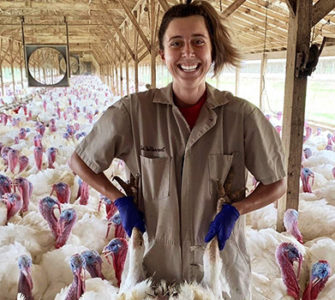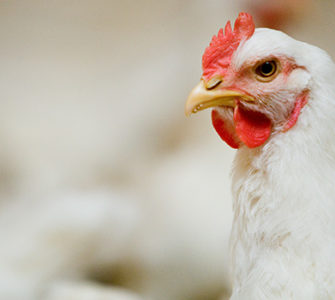Preventive measures are only option for combatting key parasites in turkeys
Turkey producers will need to rely on preventive measures including biosecurity, good gut health and genetic selection to combat three key flagellated protozoan parasites that can affect their flocks, Robert Beckstead, PhD, North Carolina State University, told Poultry Health Today.
Beckstead cited Histomonas meleagridis — the cause of blackhead disease — cochlosoma and tetratrichomonas as problem parasites in turkeys, mostly because there are no vaccines or treatments for them.
“The failure to have efficacious drugs or the [inability] to use them is a concern for most poultry producers,” he said. That coupled with the push from consumers to stop using certain medications in poultry feed makes control of the parasites difficult for producers.
H. meleagridis is spread to birds by the roundworm Heterakis gallinarum, ultimately leading to blackhead disease (histomoniasis). Chicken flocks are known reservoirs for both H. meleagridis and H. gallinarum, so turkey flocks that are close to chickens positive for these parasites have a greater chance of developing blackhead disease, said Beckstead, an associate professor at the university’s Prestage Department of Poultry Science.
More questions than answers
Not a lot is known about how turkeys contract cochlosoma, which impairs weight gain. However, the parasite is found in wild birds, which could be the source of infection for turkeys.
Histomoniasis and cochlosoma tend to appear sporadically in turkey flocks, compared to tetratrichomonas, which is found in about 70% of birds in the field. All three parasites can occur at any age, he said.
The virulence of tetratrichomonas as well as signs of the disease are other unknowns, but levels of the parasite appear to increase in birds with enteric distress. Turkey flocks near a flock positive for tetratrichomonas are going to have an increased risk for contracting the parasite, Beckstead continued.
He estimated that blackhead disease and cochlosoma have a similar negative economic impact on the turkey industry. Histomoniasis is scarier because you can lose an entire flock, which tends to cause more angst than the weight loss that occurs with cochlosoma. But economically, the losses due to both parasites are probably similar. Less is known about the economic impact of tetratrichomonas.
Control options
Biosecurity is the No. 1 way to help prevent these parasites in turkeys, Beckstead emphasized. It’s especially important to make sure workers on the turkey farm don’t interact with chickens. In addition, maintaining single-aged flocks versus multi-aged flocks will reduce the chances of having any of these parasitic problems.
Research in Beckstead’s lab indicates healthy birds are less likely to transmit parasites. He predicted that gut health is going to be an important focus regarding control of the parasites.
For example, turkeys that are flushing are more likely to transmit blackhead disease. “If you have large [coccidiosis] outbreaks, which cause birds to flush and huddle together, you’re going to get more transmission of blackhead disease,” he said.
Nutrition may also play a role. Anything in the diet that could lead to flushing, such as added salt, could contribute to transmission of parasites, Beckstead said.
Another potential control method may be genetic selection. About 5% of turkeys appear to have genetic resistance to blackhead disease. Currently, his lab is working with breeder companies and using new technology to identify genetic markers that indicate which birds are resistant.
Although there’s been some success with natural products tested in the lab, the results don’t always translate to success in the field, he indicated.
Beckstead expressed appreciation to the National Turkey Federation, which has donated funds that will enable research to continue.
NA-02037
Posted on August 19, 2019

















